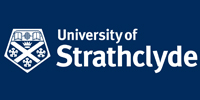The University of Strathclyde is a Scottish public research university located in Glasgow, United Kingdom with the university receiving its royal charter in 1964 as the UK's first technological university. It takes its name from the historic Kingdom of Strathclyde.
Key statistics
The University remains committed to research, teaching, useful learning and employability. As well as an award winning Careers service there is close engagement with industry through industrial placements for students and research facilities such as our Technology & Innovation Centre.The university offers a range of subjects, but has a focus on technological and scientific studies. Research is also an important part of Strathclyde’s offerings, with key focuses on health, manufacturing and energy, among others. Also on offer are a wide variety of partnerships with businesses as well as other higher education institutions, both inside and outside of the UK.
The student union building is one of the largest in the country, though Glasgow, one of the UK’s largest and most dynamic cities and a good base for exploring Scotland, the UK and Europe also has plenty to offer, from top music venues and swanky bars to hushed art galleries and plenty of green spaces.
There are more than 22,000 students, all of are based in the John Anderson campus in the centre of city. A large self-contained campus close to the city centre, it offers numerous student union and sports related facilities including football and rugby pitches, as well as indoor badminton courts and gym facilities. The £350m campus includes a £36m building for the Strathclyde Institute of Pharmacy and Biomedical Sciences; the Advanced Forming Research Centre, which will pioneer forming and forging techniques to support manufacturing for the aerospace, energy, marine and automobile industries; and the £12.5m Power Network Demonstration Centre, which will accelerate the adoption of new, smart technologies.
| Total UG Students | Total PG Students | International Student | Student Faculty Ratio |
|---|---|---|---|
| 14,965 | 6,505 | 22% | 19:8 |
The campus’s close proximity to Glasgow city centre also allows for easy access to the various activities available within the city itself, as well as access to extensive transport links. As well as this, the campus has close to 2,000 rooms available for accommodation, primarily for first year undergraduates. The Quality Assurance Agency reviewers judged that the University has excellent arrangements for the management of academic standards and the enhancement of student experience.
Notable Alumni
-
Dame Elish Angiolini – former Lord Advocate.
-
James Blyth – wind energy pioneer.
-
Ann Budge – IT entrepreneur inducted into the Entrepreneurial Exchange Hall of Fame in November 2013, and current owner of Hearts football team.
-
John Clark – Arnold Clark Automobiles.
-
John Giannandrea – Google Inc (USA).
-
David Livingstone – explorer and medical missionary.
-
John Logie Baird – invented the world's first working television.
-
Baroness Nosheena Mobarik CBE – M Computer.
-
Sir Brian Souter – Stagecoach.
-
James 'Paraffin' Young – the driving force behind the creation of today’s oil refinery industry
English Language Requirements:
Undergraduate Courses:
- 1) IELTS: 6.5 overall (no individual band less than 5.5)
- 2) TOEFL: 80 Overall (W-18, L-17, R-18, S-20).
- 3) PTE: 60 overall, with a minimum of 59 in each component
- 4) LanguageCert: 156 overall, with a minimum of 33 in each component
-
Postgraduate Courses:
- 1) IELTS: 6.5 overall (no individual band less than 5.5)
- 2) TOEFL: 80 Overall (W-18, L-17, R-18, S-20).
- 3) PTE: 60 overall, with a minimum of 59 in each component
- 4) LanguageCert: 156 overall, with a minimum of 33 in each component
(Note: Please look at individual English language qualification requirements before proceeding.)
Academic Requirement:
University of Strathclyde's entry requirements typically encompass several key criteria. Academic qualifications play a pivotal role, with a focus on high school transcripts and other graduate-level qualifications. Additionally, universities often consider applicants' extracurricular activities, including community service and leadership roles. Furthermore, letters of recommendation from teachers or mentors can be essential and a well-crafted personal statement that highlights one's passion for the chosen field of study and future goals is crucial.
To see the list of accepted qualifications (including English language qualifications) for each level of course you can see the University of Strathclyde's country-specific entry requirements page and Individual course-oriented requirements to find the appropriate entry requirements for your desired course.
Accommodation for International Students
-
New undergraduates are given high priority for accommodation as long as they apply (and have an unconditional academic offer) by a defined date in August, following UK exam results.
-
All university accommodation is self-catered, with Wi-Fi, heat and light included.
-
International students are dispersed throughout the accommodation.
-
Accommodation contracts run from September to June for undergraduate students and September to September for postgraduate students; students do not have to move out during Christmas or Easter holidays.
| Conditional Offer | Unconditional Offer | CAS |
|---|---|---|
| 4 Weeks | 10 days | 5 days |
Scholarships
Awards of £4,000 and £6,000 are available for postgraduate study through the University of Strathclyde International Scholarships (Instructional). There are numerous other scholarships.Please refer university website for detail qualifications required.
Other scholarships
You can also apply for the British Government's Chevening Scholarships, and a variety of private agencies and charities for scholarships, bursaries and grants to study in the UK. For more information visit the British Council website or the UK Council for International Student Affairs website.
Some key facts of University of Strathclyde
-
The Complete University Guide 2018 : 45
-
World University Rankings 2017 : 401-500
-
The Guardian University League Tables 2018 : 52
-
QS World University Ranking 2018: 277




